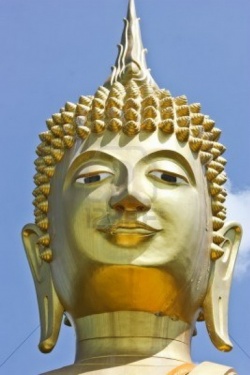Difference between revisions of "Gunavati Anagarika"
(Created page with "thumb|250px| Gunavati was born into a deeply religious family in Burma in 1924. There being no nuns in the Theravāda tradition at that time she became an ...") |
|||
| (One intermediate revision by the same user not shown) | |||
| Line 1: | Line 1: | ||
[[File:Who-r.jpg|thumb|250px|]] | [[File:Who-r.jpg|thumb|250px|]] | ||
| − | Gunavati was born into a deeply religious family in Burma in 1924. There being no nuns in the Theravāda tradition at that time she became an ''anagarika'', an unordained nun, in 1936. She perfected her knowledge of Pāḷi and became an expert in the Tipiṭaka and then studied meditation at the famous Kumāra Vihāra. One day she happened to hear about the plight of Buddhist women in Nepal and resolved to do something to help them. At that time, most women in Nepal were illiterate and were expected to spend of their time within the home concerned with household duties. Gunavati arrived in Kathmandu in 1963 and almost immediately started conducting talks on Buddhism for women, her talks being translated by Dhammavati, another dynamic woman who later became an ''anagarika'' herself. By 1965 Gunavati has established a nunnery called Srigh Vihāra where she conducted literacy classes for women and girls, taught them basic health, sewing and knitting and instructed them in Buddhism. Gunavati’s self-confidence and independence was a great inspiration for Nepalese women and her example eventually led to the woman’s movement in that country. Gunavati died in Burma in 2000. | + | Gunavati was born into a deeply [[religious]] [[family]] in [[Burma]] in 1924. There {{Wiki|being}} no [[nuns]] in the [[Theravāda]] [[tradition]] at that [[time]] she became an ''[[anagarika]]'', an unordained [[nun]], in 1936. She perfected her [[knowledge]] of [[Pāḷi]] and became an expert in the [[Tipiṭaka]] and then studied [[meditation]] at the famous Kumāra [[Vihāra]]. One day she happened to hear about the plight of [[Buddhist]] women in [[Nepal]] and resolved to do something to help them. At that [[time]], most women in [[Nepal]] were illiterate and were expected to spend of their [[time]] within the home concerned with household duties. Gunavati arrived in {{Wiki|Kathmandu}} in 1963 and almost immediately started conducting talks on [[Buddhism]] for women, her talks {{Wiki|being}} translated by Dhammavati, another dynamic woman who later became an ''[[anagarika]]'' herself. By 1965 Gunavati has established a [[nunnery]] called Srigh [[Vihāra]] where she conducted literacy classes for women and girls, [[taught]] them basic [[health]], sewing and knitting and instructed them in [[Buddhism]]. Gunavati’s [[self-confidence]] and {{Wiki|independence}} was a great inspiration for [[Nepalese]] women and her example eventually led to the woman’s {{Wiki|movement}} in that country. Gunavati [[died]] in [[Burma]] in 2000. |
{{R}} | {{R}} | ||
[http://www.buddhisma2z.com/content.php?id=515 www.buddhisma2z.com] | [http://www.buddhisma2z.com/content.php?id=515 www.buddhisma2z.com] | ||
Latest revision as of 17:08, 6 December 2016
Gunavati was born into a deeply religious family in Burma in 1924. There being no nuns in the Theravāda tradition at that time she became an anagarika, an unordained nun, in 1936. She perfected her knowledge of Pāḷi and became an expert in the Tipiṭaka and then studied meditation at the famous Kumāra Vihāra. One day she happened to hear about the plight of Buddhist women in Nepal and resolved to do something to help them. At that time, most women in Nepal were illiterate and were expected to spend of their time within the home concerned with household duties. Gunavati arrived in Kathmandu in 1963 and almost immediately started conducting talks on Buddhism for women, her talks being translated by Dhammavati, another dynamic woman who later became an anagarika herself. By 1965 Gunavati has established a nunnery called Srigh Vihāra where she conducted literacy classes for women and girls, taught them basic health, sewing and knitting and instructed them in Buddhism. Gunavati’s self-confidence and independence was a great inspiration for Nepalese women and her example eventually led to the woman’s movement in that country. Gunavati died in Burma in 2000.
